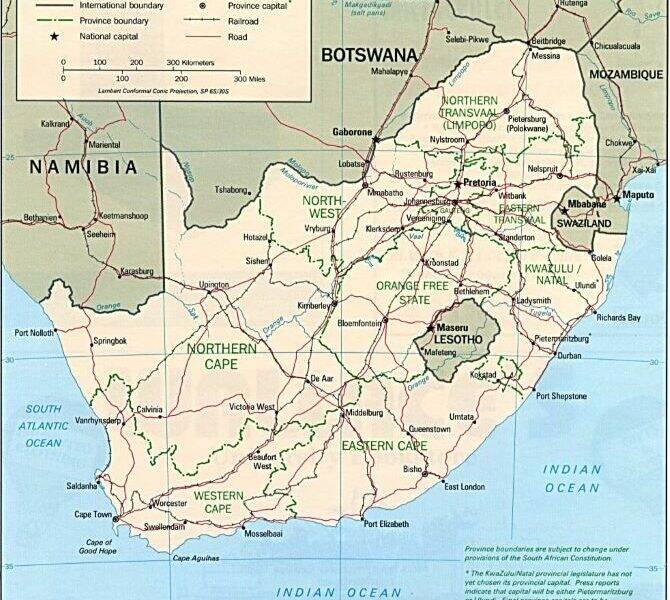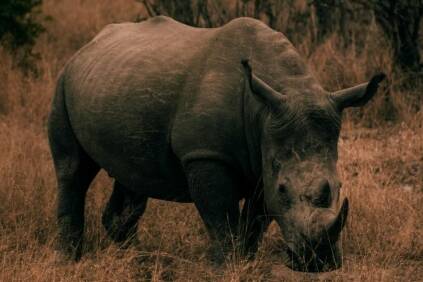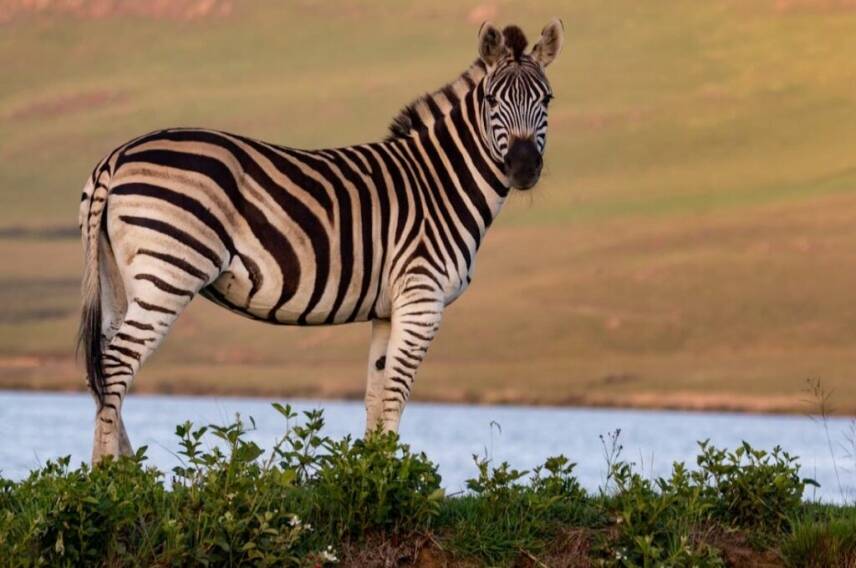The act of hunting in South Africa is a storied one. From the first San and Khoi people who walked our soil to modern-day trophy hunters, game hunting in South Africa isn’t going anywhere anytime soon. Our country is home to diverse landscapes and climates, a choice selection of both traditional African big game hunting targets, and multiple antelope species. South Africa has a lot to offer hunters worldwide, looking for their next safari hunting fix and enough choices to keep them coming back time and again.
[DYNAMIC-BLOGTABLEOFCONTENT]
What makes Hunters choose Hunting Safari in South Africa?
South Africa is a game hunting destination that draws hunters for various reasons:
- Diverse wildlife – South Africa offers both big game hunting and plains game hunting opportunities.
- Cost – hunting in South Africa is more affordable than other African hunting destinations.
- Organized and secure – our hunting industry is controlled, regulated, and with experienced outfitters readily available and able.
- Low health concerns – there are only a handful of areas in South Africa with malaria risks, and standard traveler safety practices are enough to see you through.
- Weapons Permit – all firearms brought into the country require a Temporary Import permit. It is relatively easy to obtain from the Firearms office in the airport.

A Hunting Safari in South Africa – Areas, Animals, and Hunting Methods
With such a diversity of game hunting wildlife, South Africa not only offers an array of species, but also a range of hunting methods. While most safaris are stalk and shoot, there are bait and blind options, and we even cater to the world’s bow hunters!
Wildlife Area Classifications
National Parks
An example is probably the most famous South African park of all, the Kruger National Park. Areas like these are managed by the national government and hunting is only completed in specific areas within the park.
Provincial Parks
These areas are under the control of provincial or local government, and not all of them may allow hunting. Examples include the Ithala Game Reserve in KwaZulu Natal, De Hoop Nature Reserve in the Western Cape, and Madikwe Game Reserve in the North West.
Private Nature Reserves
The majority of these only allow traditional tourism practices, while a small amount allows them as a means of funding their conservation programs.
Game Ranches
This is the type of area where most hunting will take place. Game ranches typically breed wildlife that will then stock hunting ranches or reserves.
What is the Difference between Game Farming and Game Ranching?
Game farming involves a smaller operation solely producing hunting stock animals, while game ranching is a much bigger setup and includes tourism, game sales, photograph safaris, and hunting.
South African Safari Hunting Species
- Lion
- Black rhino
- Leopard
- Hippopotamus
- Elephant
- Crocodile
- White rhino
- Cape buffalo

African Plains Game and Specialty Species
Black wildebeest, Common reedbuck, Blue wildebeest, Klipspringer, Common blesbok, Bush pig, White blesbok, Blue duiker, Bontebok, Grey duiker, Bushbuck, Red duiker, Cape eland, Gemsbok, Livingstone eland, Grey Rhebuck, Giraffe, Impala, Caracal, Jackal, Kudu, Ostrich, Red lechwe, Nyala, Oribi, Mountain reedbuck, Roan antelope, Sable antelope, Common springbok, Black springbok, White springbok, Steenbok, Tsessebe, Waterbuck, Warthog, Zebra, Cape grysbok, Blackbuck, Suni, Brown Hyena, various Mongooses, Honey Badger, Baboon, Vervet Monkey, and Spotted Hyena.
South African Safari Hunting Experiences – What, Where, and How to Hunt
South Africa consists of 9 provinces, each with their own wildlife demographic, so for ease of explanation, this section will cover hunting in South Africa on a provincial level.
Limpopo
Named after the famed Limpopo River, this province borders Zimbabwe and Botswana. A mostly rural landscape, a large majority of South Africa’s game hunting takes place in this province; further divided into two distinct areas namely, the Lowveld and the Highveld. Across these areas, you can expect to find Big 5, kudu, sable, roan, tsessebe, zebra, and brown hyena.
KwaZulu–Natal (KZN)
Most hunting in this province takes place in the Zululand region, and the symbol of Natal safari hunting used to be the Nyala, which is now also available in other provinces. Wedged between the Drakensberg Mountains and the Indian Ocean, KZN offers forests and wetlands as part of its landscape. In the Midlands area, you’ll find gray reedbuck, common reedbuck, bushbuck, waterfowl, and eland. Kudu can be found in the area transitioning between the Midlands and Zululand.
Eastern Cape
The second largest province in South Africa is home to some of the most diverse landscapes in the country. Within the Eastern Cape, you can find yourself in evergreen areas along the coast, wooded valleys, and even the semi–arid landscape of the Karoo. Game hunting targets include the kudu, Cape grysbok, gray reedbuck, and blue duiker, while caracal hunts are also available.
Western Cape
The Western Cape is a good choice for a hunting safari in South Africa if your family or non–hunters will be tagging along. It offers some of the best tourist activities and attractions in the country. In the coastal areas, you can find plains game; while traveling more towards the interior of the country, you can find gemsbok and springbok. Other game hunting choices are the red lechwe, Cape buffalo, Cape grysbok, and klipspringer.
Northern Cape
Ironically, the largest South African province is also the least populated, giving you a true sense of a vast expanse of prime hunting territory. Springbok, red hartebeest, gemsbuck, blesbok, and blue wildebeest inhabit some of the region’s game ranches. Other areas provide leopard, lion, rhino, buffalo, sable, red lechwe, and Scimitar–horned Oryx. For a lesser-known game hunting experience that is second to none, you can also try your hand at ostrich.
Free State
With a large agricultural sector producing sunflower and maize, the Free State is a great bird hunting opportunity, as it attracts guinea fowl, speckled pigeons, dove, spurfowl, and yellow–billed ducks. Big game hunting species like blesbok, springbok, black wildebeest, and gemsbuck are also available. A unique experience is horseback hunting for eland in the Maluti Mountain region.
Gauteng
South Africa’s gateway for international flights is known as the “Place of Gold.” Both its hilly Highveld and almost savannah–like bushveld ranges offer some great game hunting experiences. In the former, one can find yourself hunting eland, blesbok, springbok, and black wildebeest; while the latter provides for warthog, kudu, blue wildebeest, and impala. Non–hunters can enjoy various animal-related activities like elephant interaction and visits to wildlife rehabs, and many upmarket shopping centres and tourist markets.
North West
Home to South Africa’s platinum mining industry, the “Platinum Province” is also home to the Bushveld, plateau Highland, and fragments of the Kalahari Desert. These areas are relatively close in proximity, allowing you to travel between different hunting landscapes without losing precious time. The province is home to klipspringer, warthog, gemsbuck, kudu, Limpopo bushbuck, and buffalo.
Mpumalanga
Home to forests, waterfalls, valleys, mountain passes, and rivers, as well as the famed Kruger National Park, the picturesque landscape lives up to its meaning of “the place where the sun rises.” The Lowveld side of the Drakensberg Mountains offers big game hunting opportunities for leopards and lions when quotas are available; other games include serval, spotted hyena, waterbuck, kudu, Nyala, and waterbuck. The frosty Highveld offers gray reedbuck, blesbok, eland, black wildebeest, and springbok.
Common Methods for Hunting in South Africa
Walk and Stalk
This good old-fashioned method involves walking the area until you spot a suitable target to stalk or tracks to follow to a potential target.
Drive and Stalk
Here you’ll drive through the bush until spotting an animal. You will then leave the vehicle and stalk on foot.
Glassing
This involves the use of a hill or elevated point to spot your game hunting target using binoculars. You can either approach (stalk) the animal to close the distance or, if possible, shoot from your vantage point.
Blind
This method involves a blind erected near a watering hole or bait site and used for rifle hunting, bow hunting, or archery hunting. It involves a lot of waiting patiently and relying on the PH to determine if the trophy is worthwhile. Patience is key!
Bow Hunting
The use of bow hunting when hunting in South Africa has been legal since the mid-80s and is available in various hunting areas. Bow hunting requirements depend on the classification of the animal targeted.
Category 1 species
Game birds, pygmy antelope, and small carnivores
- 300-grain minimum
- 40-pound minimum draw mass
- 30 ft/lbs minimum kinetic energy
Category 2 species
This is medium game such as springbok, nyala, blesbok, impala, reedbuck, and warthog.
- 400-grain minimum
- 50-pound minimum draw mass
- 50 ft/lb minimum kinetic energy
Category 3 species
This includes large game like hartebeests, zebra, sable, kudu, and gemsbuck.
- 500-grain minimum
- 60-pound minimum draw mass
- 60 ft/lb minimum kinetic energy
Category 4
Cape buffalo
- 750-grain minimum
- 80-pound minimum draw mass
- 80ft/lbs. minimum kinetic energy
Category 5
Giraffe
- 750-grain minimum
- 90-pound minimum draw mass
- 90ft/lbs. minimum kinetic energy
The hunting of elephants and rhinos using bows is illegal in South Africa.
Things to know about Hunting in South Africa as an International Hunter
General Rules
The following are some of the foundational rules for hunting in South Africa. Individual provinces may have some of their own regulations in addition to these, but your outfitter can assist with any specific rules relating to your hunting destination.
- All international hunters must be in the company of a registered professional hunter, and all outfitters
must be licensed. Both the PH and outfitter must be licensed in the specific province where the hunt is taking place.
- All licenses must be prearranged.
- The general rule for your caliber when hunting in South Africa is a minimum of .375
- Some provinces allow hunting from a vehicle, while others dictate you must be at least 200 yards from a vehicle before firing. This can be discussed with the outfitter.
- Special hunting permits are available for night hunting and hunting with artificial light.
- South Africa only permits hunting during daylight hours (30 minutes after sunrise to 30 minutes before sunset) unless special permits have been issued.
- Quotas and seasonal availability can be set and changed by the owner of the land or ranch where the hunt is taking place.
Permits
TOPS
Threatened or Protected Species (TOPS) permits are required for animals classified as endangered, threatened, or vulnerable by the Department of Environmental Affairs and Tourism. Information needed for a TOPS permit includes the hunter’s full name and physical address, the information of the farm hosting the hunt, and the period for which the hunt will take place.
Animals requiring a TOPS permit include amongst others, Bontebok, Brown and Spotted hyena, Black Wildebeest, Sharpe’s grysbok, Blue duiker, Honey Badger, Cape fox, Leopard, Elephant, Lion, Oribi, Nile crocodile, Common reedbuck, White rhino, Roan, Black rhino, Serval, Tsessebe, Suni, Cape and Hartman’s zebra.
CITES (Convention on International Trade in Endangered Species of Wild Fauna and Flora)
These permits regulate the international export and import of animal trophies. You will need a CITES permit from the country of your hunt and the country to which you are exporting the trophy. Similar to TOPS, this permit also requires the hunter’s name and physical address, information on the farm, and the time of the hunt. This permit must also be pre–arranged with the outfitter.
| Appendix 1 Species (App.1) | Appendix 2 species (App. 2) |
| · Leopard | · Hippopotamus (seen as App. 1 by the EU) |
| · Black rhino | · Elephant (seen as App. 1 by the EU) |
| · Scimitar – horned Oryx | · Lion (seen as App. 1 by the EU) |
| · Cheetah | · Crocodile |
| · Ground pangolin | · Bontebok (seen as App. 1 by the USA) |
| · Black – footed cat | · Caracal |
|
| · Hartmann zebra |
|
| · Cape Mountain zebra (no export to USA) |
|
| · White rhino |
|
| · Baboons and monkeys |
|
| · Blue duiker |
|
| · African wild cat |
|
| · Red lechwe |
|
| · Giraffe |
|
| · Serval |
Appendix 1 species
These species require an Import and Export permit. An export permit can only be applied for when the import permit is received by the trophy handler.
Appendix 2 species
As with Appendix 1, these species require both Import and Export permits. The export permit is applied for first, with the Import permit issued on arrival of the trophy.
Weapons
Bringing a rifle into South Africa is allowed, however, certain airlines do not carry firearms. You’ll either have to speak with your hunting outfitter or double–check with the airline. Both Airlink and FlySafair allow for travel with hunting rifles, handguns, and ammunition, but this must be prearranged and checked in separately. South Africa limits weapons to two hunting rifles, one shotgun (single or double), and one handgun .45 or smaller per person.
No automatic or semi–automatic weapons, or pump action shotguns are allowed. Those traveling with firearms must report to the SAPS Firearms office in Johannesburg International Airport as soon as they have cleared immigration. Here you are issued with a Temporary Import Permit. It is up to you to ensure the correct export paperwork is available.
Other weapon-related regulations for hunting in South Africa include:
- Dangerous game and giraffe require a minimum caliber of .375
- Elephant ammunition must either be monolithic solid or full metal jacket.
- Plains game smaller than a springbok requires .270 or 7mm.
- Plains game hunting also requires a minimum .357 long-barrel handgun if that is your choice.
Should you choose not to travel with your weapons, most outfitters offer weapon rental, which is legal in South Africa. This must be prearranged.
Health Checks and Requirements
When planning your hunting safari in South Africa it is advised to visit your doctor at least one month before your departure. The following vaccinations and precautions are recommended:
- Cholera – only when active cases are present.
- Malaria – most of SA is malaria-free, however, prescription medicine is still advised depending on the area.
- Rabies – if you are bitten by a dog or other animal, you need to seek medical attention as soon as possible.
- Hepatitis A and B and typhoid vaccines – this is recommended for most unvaccinated travelers
- Yellow fever – recommended for any traveler passing through a Yellow Fever area.
- Sun protection measure – South Africa has consistently high UV indexes even when the weather is overcast. Sunscreen and protective clothing are strongly recommended, and keeping up your fluid intake is suggested to help prevent dehydration or worsen heatstroke.
- Snake bites – across South Africa, the bush is home to many venomous snake species, including the black mamba, rinkhals, puff adder, Cape cobra, and boomslang. Their venom has different effects, including neurotoxic, necrotic, or even haemotoxic reactions.
Money Matters
Most businesses, including shops, accommodation facilities, restaurants, and, resorts have card machines and ATM services available. However, if you’re arriving with cash this is limited to R25 000 and must be declared at arrival.
South Africa at a Glance
- 12 official languages (including South African Sign Languages)
- Currency is the Rand
- Hunting in South Africa offers both Big 5 and plains game opportunities.
- South Africa offers a year-round hunting season, but the main season is considered to be between April to September.
South Africa is a great option for game hunting as it provides for a diverse range of both big game hunting and plains game targets. SA also offers value for money in hunting, as our hunts are very competitive when compared with other African countries. Our PHs and outfitters must adhere to strict policies surrounding permits and regulations so you can be assured that you and your hunt will be above board and in the best hands possible.
South Africa is the perfect game hunting destination, offering hunters and their families a wonderful array of activities and experiences.
Check out some a blog relating to springbuck hunting in South Africa or learn more about this diverse hunting safari destination.
Author: A.Baker
